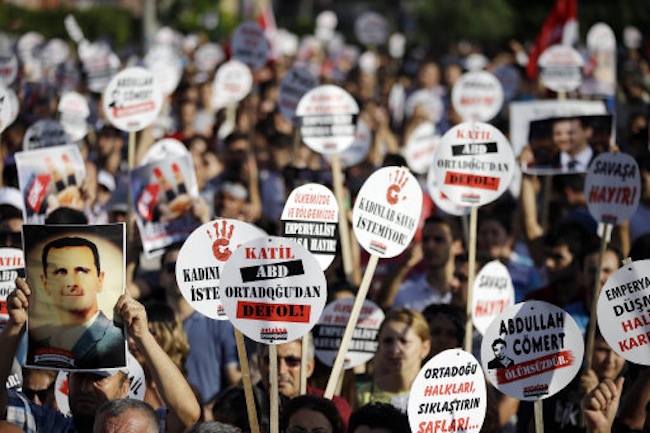Syria: Obama provokes the war his America, France and Britain escalated
SO. The UK is not in favour of war in Syria. We won’t meddle. Sure, in 2011 Foreign Secretary William Hague said Syrian President Bashar al-Assad was “losing legitimacy”.
And sure Hilary Clinton opined:
“From our perspective, he has lost legitimacy. Our goal is to see that the will of the Syrian people for a democratic transformation occurs.”
So. We won’t got to war. But we will support the Syrian opposition, give them heart by calling Assad an illegitimate leader.
And when France, America and Britain recognised the Syrian National Council, the West wasn’t interfering at all.
And when we read in the NY Times over event in 2012, we realised how benign the US was:
A small number of C.I.A. officers are operating secretly in southern Turkey, helping allies decide which Syrian opposition fighters across the border will receive arms to fight the Syrian government, according to American officials and Arab intelligence officers.
So. Having helped escalate war and given succour to Assad’s enemies, can Barack Obama sell it to the US people?
A WaPo-ABC poll show that support for his war is less than for a pervious adventure:
…nearly six in 10 oppose missile strikes in light of the U.S. government’s determination that Syria used chemical weapons against its own people. Democrats and Republicans alike oppose strikes by double digit margins, and there is deep opposition among every political and demographic group in the survey. Political independents are among the most clearly opposed, with 66 percent saying they are against military action…
Only 32 percent said Obama had explained clearly why the U.S. should launch strikes. Back in March 2003, as the Iraq War started, 49 percent said that President George W. Bush had compellingly made his case for what was then at stake.
James Taranto looks at the lessons of Iraq.
The appeal of Barack Obama in 2008 lay not only in his status as the only serious Democratic candidate to have opposed the war from the outset, but also in the belief that his conciliatory rhetoric, along with his “multicultural” identity (black, with Muslim ancestors and an Arabic middle name to boot!) would “restore our moral standing,” as the future president put it in his nomination speech, and usher in “a new beginning,” as he announced in Cairo in June 2009.
Obama’s supporters would now have us believe that his swaggering words are as powerful as his soothing ones were supposed to have been. . . .
This is an example of magical thinking that is not wishful. It would indeed be a big tactical mistake for Assad either to attack U.S. forces or again to use chemical weapons while congressional action is pending. But that is because of Obama’s political weakness, not his rhetorical strength. Congressional assent to Obama’s request for military authorization is far from assured; if Assad wants to keep it that way, he will lie low as the debate plays out…
These past statements indict the president for hypocrisy, but they do not prove the case beyond a reasonable doubt. In his defense one might claim that his moral sensibility has matured over the past six years. Perhaps, that is, he has grown in office–though he has not grown nearly enough by other measures that one can say he is up to the job.
Unless in the next week or so he discovers a heretofore unrealized capacity to move public opinion on substantive matters of policy, the expedient thing for lawmakers of either party to do will be to vote “no” while smugly minimizing the moral stakes by noting that while Assad is of course “a bad guy,” he poses no imminent and direct threat to the United States, the Syrian economy is in shambles, there are lots of other mass-murdering dictators and we can’t bomb ‘em all, and so forth.
Any opportunistic lawmaker who takes that path will be following the example set by the man who is now president of the United States.
So. what does Obvama want? This:
Senate Foreign Relations Committee – Syria AUMF
What we have here is a commitment to degrading the military resources of Assad and an utterly unenforceable attempt to limit that campaign only to prevent the use of chemical arms. If you have never seen a loophole that big before, gaze into it some more. It is so vast you could fit Iraq into it.
Photo: A protesters holds up a poster of Syrian President Bashar Assad near placards reading “U.S. killer, get out the middle east” during a demonstration in Hatay, Turkey, Sunday, Sept. 1, 2013. The United States is considering launching a punitive strike against the regime of Syrian President Bashar Assad, blamed by the U.S. and the Syrian opposition for an Aug. 21 alleged chemical weapons attack in a rebel-held suburb of the Syrian capital of Damascus. The U.S. said the attack killed 1,429 people, including at least 426 children. Those numbers are significantly higher than the death toll of 355 provided by the aid group Doctors Without Borders. (AP Photo/Gregorio Borgia)
Posted: 5th, September 2013 | In: Reviews Comments (2) | TrackBack | Permalink



